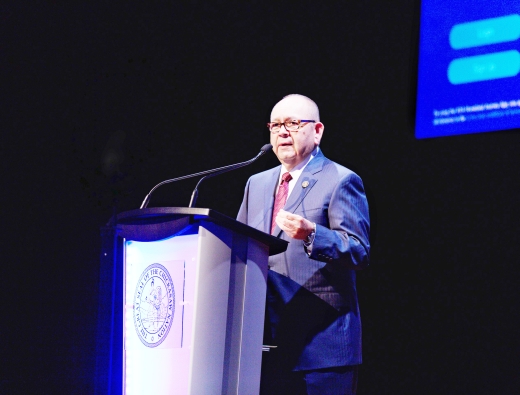Governor says ‘Chickasaw Nation is stronger than ever before’

This article appeared in the November 2017 edition of the Chickasaw Times
TISHOMINGO, Okla. – During his October 7 State of the Nation address, Governor Bill Anoatubby outlined decades of remarkable growth.
Addressing a gathering that filled Fletcher Auditorium and spilled over into an adjacent tent, Gov. Anoatubby said the number of enrolled citizens has increased by more than 17,000 since 2001.
“Today, we have the greatest number of Chickasaws ever,” Gov. Anoatubby said. “More Chickasaws than ever before are engaged with our culture. More Chickasaws than ever before are united and working together to move our nation forward. More Chickasaws than ever before can stand and celebrate because today, the state of the Chickasaw Nation is stronger than ever before!”
When the applause tapered off, he went on to note that the executive, legislative and judicial departments of Chickasaw Nation government were united in their commitment “to enhance the overall quality of life of the Chickasaw people.”
Business diversification, economic development and changes in federal policy in recent decades, Gov. Anoatubby said, had enabled the Chickasaw Nation to reach new levels of success.
“As we experienced success in key areas, such as business, health care, education and housing, and as our businesses began to make more money, we looked for opportunities to expand our efforts,” he said.
Those new efforts include community centers and senior centers, as well as programs and services for elders and veterans. Earlier this year, a new community center and a senior center were completed in Tishomingo.
Construction is under way in Oklahoma City on a community center as well as a senior center designed to serve Chickasaw elders and other citizens there.
The Chickasaw Nation dedicated a 15,000-square-foot lodge in Ada Oct. 2. The Veterans Center will serve veterans who live in the area, as well as veterans who travel to the area to visit the Chickasaw Nation Medical Center.
“This will be a great place for our veterans to gather for fellowship or to find assistance with counseling or other services,” Gov. Anoatubby said.
Health care is another area where policy changes and business success have led to significant progress.
“In 1994, we decided to do something big – to compact with Indian Health Service to operate the Carl Albert Indian Health Facility and our satellite clinics, our entire health system,” Gov. Anoatubby said. “We were the first tribal nation to take responsibility for our own health care system, and there were some who thought we might fail.
“But we were confident we would be able to develop services that would meet the needs of our people, because we understood the needs of our people.”
As changes were made to improve the delivery of health care, more patients came to Chickasaw Nation facilities. Eventually, health care needs increased to the point new facilities were required.
A new, state-of-the-art medical center constructed using tribal business revenues was opened in 2010. Since then, clinics have been expanded and new services, including pediatrics and dental, have been added.
Gov. Anoatubby pointed to the passage of the Native American Housing and Self-Determination Act (NAHASDA) as a turning point in the provision of housing services. Under NAHASDA, the Chickasaw Nation took responsibility for the administration of its housing programs
“We immediately went to work conducting needs-assessment meetings to determine what building programs and services would most benefit Chickasaw families,” Gov. Anoatubby said. “From these meetings, we developed new housing specifications and a multitude of new programs, because we wanted to offer something more than a house. We wanted to offer a house that is a home, because housing programs are really about helping all our Chickasaw people feel at home.”
Since NAHASDA was passed in 1996, more than 1,300 families have received home loans totaling more than $145 million through the Chuka Chukmasi Home Loan program. During the same period, more than 2,700 families have received grants to assist with down payment and closing costs.
Other housing programs have helped more than 2,500 families fund home improvements and enabled more than 4,300 families to have storm shelters installed on their property.
Continued improvements in a variety of services are planned well into the future.
The Chickasaw Nation provides support to more than 5,000 students each year with critically important education funding. Gov. Anoatubby announced more dollars for tuition would be available for 2018, and the number of credit hours funded will be increased from 12 to 15 credit hours per semester. The book grant available to college students will also be increased beginning in the fall semester of 2018.
Recently, the Chickasaw Nation has begun branching out into film production to tell the Chickasaw story. “Te Ata,” a feature film about the famous Chickasaw storyteller, is currently playing in select theaters across the country.
Another feature film, “Chickasaw Rancher,” tells the story of Montford Johnson. The film is in post-production. “Chickasaw Rancher” tells the story of Montford Johnson, a Chickasaw who overcame a difficult childhood and numerous hardships to establish a vast ranching business in nineteenth century Indian Territory.
“If this story sounds familiar, it should,” Gov. Anoatubby said. “The story of Montford Johnson parallels the story of our own tribe over the last 30 years. Like the Chickasaw rancher, we have overcome various challenges to establish businesses and become prosperous.”
Governor Anoatubby encouraged attendees to take pride in their heritage and to tell their own stories.
“Fellow Chickasaws, let us stand up and tell the story of our people proudly – the story of how we overcame great obstacles to grow and prosper,” he said. “The story of a tribe that invests in its youth and encourages them to find their passion in life. The story of people who honor, respect and give back to their elders and veterans. The story of a nation that today is strong and getting stronger.”